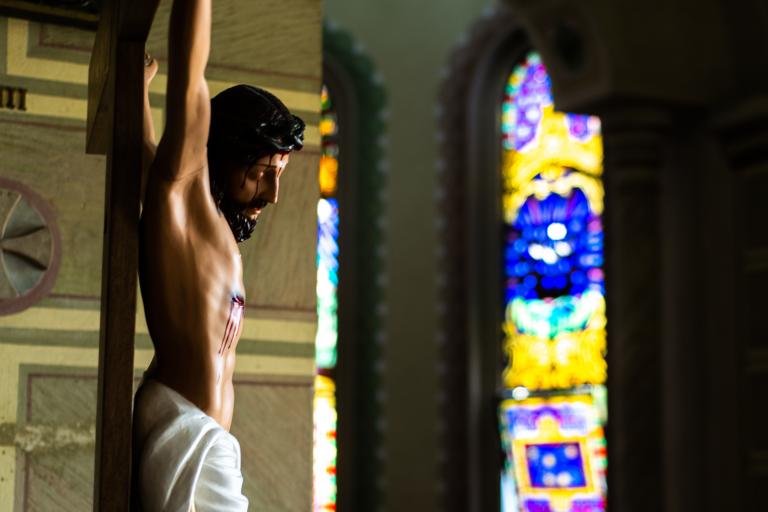An email came to me today, with this question:
Dear Carl, I read your Big Book of Christian Mysticism a few years back, and it was very helpful for me in my understanding of the interrelation between the different “types and sorts” of mysticism. And you yourself have a pretty big inroad into different mystical communities, I know. How have you seen the gospel of redemption go forth into these communities?
An interesting question, so let me try to take it apart.
I’m not quite sure what the questioner means by “different mystical communities.” Christian mysticism has typically flourished more in communal settings rather than in solitary states, although there have certainly been Christian mystics who lived solitary or eremitic lives (i.e., as hermits). Julian of Norwich is perhaps the most famous example, but she’s hardly the only one. However, most followers of Christ recognize the point made by St. Basil the Great: “If you live alone, whose feet shall you wash?” So community is pretty much hard-wired into Christian spirituality, at least for most people.

But what “mystical communities” are available to us today? For some seekers of the mystical life, such communities are found by becoming monks or nuns — or joining some other type of intentional community. But for most of us, we balance our desire for a contemplative community with the ordinary demands of secular life: having a family, a career, a home, and perhaps membership in a local church. Often, local churches are not particularly congenial to the mystical life! Therefore, many people choose, in addition to or instead of membership in a local church, to become involved in organizations like Contemplative Outreach, the World Community for Christian Meditation, Shalem, the Living School, Wisdom Schools, and/or lay associate communities affiliated with religious orders, such as Benedictine Oblates or Lay Carmelites or Third Order Franciscans. Such “para-church” communities often have an explicit orientation toward contemplative spirituality, and therefore are much more congenial to those who feel called to intentionally pursue the mystical life.
I’m saying all this to respond to the question above: that “mystical communities” come in many shapes and sizes — just like Christianity in general, which can be expressed in Orthodox, Catholic, Anglican, Protestant, Reformed, Evangelical or Pentecostal ways.
So to answer this question: How have I seen the gospel of redemption go forth into mystical communities? My first response would be that it really depends on the community.
Generally speaking, the more theologically conservative communities tend to place more of an emphasis on redemption, because such communities are more concerned about traditional theological teachings — such as humanity is sinful, and Christ came to redeem us.
By contrast, communities that tend to be less oriented toward traditional theological ideas would place less emphasis on redemption — not because they are opposed to the Christian ideas of redemption but rather because they consider it more important to emphasize prayer and spirituality over propositional doctrines and dogmas.
Once again: not because they reject such doctrines, but simply because they would suggest that thinking the right thoughts about God or Christ is less important than engaging in the spiritual practices necessary to foster a living relationship with God.
I know a Jesuit priest who would be more interested in whether or not you have ever felt or experienced a sense of being redeemed — to him, that would matter more than whether or not you were able to explain the theology of redemption. That might not win him any awards from the Society for the Preservation of Orthodox Doctrine (which, to the best of my knowledge, doesn’t exist), but it does make him an effective pastor and insightful spiritual director.
Seekers and practitioners of contemplative and mystical spirituality tend to have a very pragmatic approach to doctrine and dogma. Anyone can learn how to explain the intricacies of dogmatic formulas — but how has this teaching changed your life? If you believe Christ is your redeemer, then how does having a redeemer make a practical, real difference in your life and your relationships, right here and right now?
In the title to this blog post, I rephrased my reader’s question like this: Do Christian mystics believe in redemption? And the answer, based on my knowledge and experience, is of course they do. For some, doctrines like the redemption matter more than others. But even those who rarely or never talk about redemption are not in any way opposed to it. It’s a pretty universal Christian idea that humanity suffers from both an innate and a freely-chosen tendency to resist or reject love. Whether you call this sin, or depravity, or woundedness, it’s a pretty easily observed quality of the human condition. And since this universal tendency to resist or reject love causes so much suffering, naturally we want to do something about it. Christianity teaches that the spiritual healing we so long for comes through Christ. He is our redeemer.
Again, there are many different ways in which Christ’s redeeming action is understood. For example, the medieval mystic Julian of Norwich has a beautiful theology which sees the redeeming work of Christ as purely an expression of Christ’s love — and joy. Others, of course, emphasize ideas such as “paying a debt” or a “substitutionary atonement.” Since mystics and contemplatives tend to have such a strong theology of God as Love, I would imagine that many are more comfortable with the idea of redemption-as-expression-of-love rather than redemption-as-paying-off-a-debt. But I certainly can’t speak for others, and I’m sure that if you interviewed a cross section of contemplative Christians you would find many different perspectives on the theology of redemption — just as you would find many different perspectives on redemption if you just talked to all Christians, in general.
So yes, mystics believe in redemption; but many of them probably don’t place a lot of emphasis on it. They are less quick to emphasize doctrine and much more inclined to emphasize spiritual practice. Pray, meditate, contemplate, and open your heart to the Holy Spirit in silence. Do that every day for a while, and you will discover God’s redemption at work in your heart. You may not be able to explain it to the satisfaction of some academics. But you’ll be living it: embodying Christ’s redeeming work in the world, bringing healing both to your own heart and to the hearts of those whom you joyfully serve.
Featured photo by Mateus Campos Felipe on Unsplash.
Enjoy reading this blog?
Click here to become a patron.














